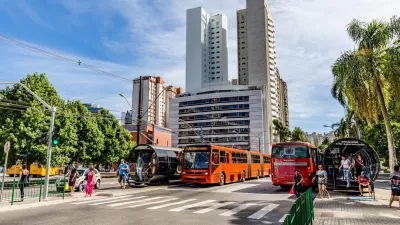The Dirt interviewed Jamie Lerner, an architect, designer, and former Mayor/Governor from Brazil who is credited with introducing the world's first BRT system in Curitiba, Brazil.
From the interview by The Dirt:
"In many cities, if the slums are on the hills or deep in valleys, they're difficult to access. In these places, people are throwing away their garbage and polluting the streams. Their children are playing in polluted areas. In 1989, we started a program where we said, Okay, we're going to buy your garbage as long as you put your garbage in a bag, and bring it to the trucks, where it's more accessible. In two or three months, all these areas were clean, and these very low-income people had an additional source of income."
"Some places in some cities have become decayed. There's no life. When that happens, it's very difficult to bring back life because people don't want to live in a place like that. However, the moment we bring street life, people will want to live there again. That's why we designed the portable streets. On a Friday night, we can deliver a portable street and remove it Monday morning. We can put a whole street life in front of a university or any place, bringing street life back."
FULL STORY: Interview With Jaime Lerner

Planetizen Federal Action Tracker
A weekly monitor of how Trump’s orders and actions are impacting planners and planning in America.

Restaurant Patios Were a Pandemic Win — Why Were They so Hard to Keep?
Social distancing requirements and changes in travel patterns prompted cities to pilot new uses for street and sidewalk space. Then it got complicated.

Maui's Vacation Rental Debate Turns Ugly
Verbal attacks, misinformation campaigns and fistfights plague a high-stakes debate to convert thousands of vacation rentals into long-term housing.

In California Battle of Housing vs. Environment, Housing Just Won
A new state law significantly limits the power of CEQA, an environmental review law that served as a powerful tool for blocking new development.

Boulder Eliminates Parking Minimums Citywide
Officials estimate the cost of building a single underground parking space at up to $100,000.

Orange County, Florida Adopts Largest US “Sprawl Repair” Code
The ‘Orange Code’ seeks to rectify decades of sprawl-inducing, car-oriented development.
Urban Design for Planners 1: Software Tools
This six-course series explores essential urban design concepts using open source software and equips planners with the tools they need to participate fully in the urban design process.
Planning for Universal Design
Learn the tools for implementing Universal Design in planning regulations.
Heyer Gruel & Associates PA
JM Goldson LLC
Custer County Colorado
City of Camden Redevelopment Agency
City of Astoria
Transportation Research & Education Center (TREC) at Portland State University
Camden Redevelopment Agency
City of Claremont
Municipality of Princeton (NJ)



























